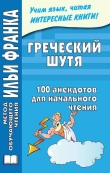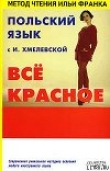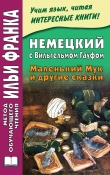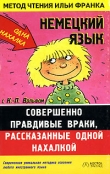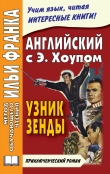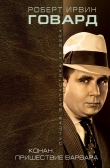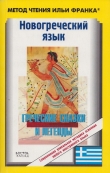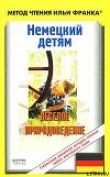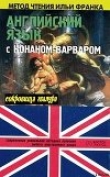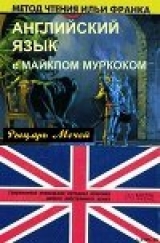
Текст книги "Английский язык с М. Муркоком"
Автор книги: Майкл Джон Муркок
Соавторы: Илья Франк,Андрей Еремин
Жанры:
Языкознание
,сообщить о нарушении
Текущая страница: 27 (всего у книги 36 страниц)
There was nothing for it but to allow the boat to bear him where it would (ничего не оставалось, кроме как позволить лодке нести его, куда она понесет = отдаться на волю волнам). The giant had long since disappeared in the mist (великан давно уже исчез в тумане), heading towards the Thousand League Reef where perhaps he lived (направляясь к Тысячемильному Рифу, где, возможно, он жил).
Like a shark pouncing on its prey, the little boat moved (как акула, набрасывающаяся на свою добычу, /стремительно/ двигалась маленькая лодка; to pounce – бросаться, внезапно атаковать), until suddenly it broke through the mist into hot sunshine (пока вдруг не пробилась сквозь туман = вырвалась на жаркий солнечный свет).
And Corum saw a coast (и Корум увидел берег). Cliffs rushed at him (утесы устремились = быстро приближались к нему).
due [dju:] chasm [kæzm] pouncing [ˈpaunsɪŋ] prey [preɪ]
Now the giant, still cloaked in mist, changed his course, still fishing. He was behind Corum's boat and he trudged on through the water, dragging his nets behind him.
The wash sent the boat flying away from the Thousand League Reef, heading almost due east, and there was nothing Corum could do to stop it. He fought with the sail and the tiller, but they would not respond. It was as if he was borne on a river rushing towards a chasm. The giant had set up a current which he could not fight.
There was nothing for it but to allow the boat to bear him where it would. The giant had long since disappeared in the mist, heading towards the Thousand League Reef where perhaps he lived.
Like a shark pouncing on its prey, the little boat moved, until suddenly it broke through the mist into hot sunshine.
And Corum saw a coast. Cliffs rushed at him.
CHAPTER TWO (глава вторая)
Temgol-Lep (Темгол-Леп)
Desperately Corum tried to turn the boat away from the cliffs (отчаянно пытался Корум повернуть лодку от утесов). His six-fingered left hand gripped the tiller and his right hand tugged at the sail (его шестипалая левая рука схватилась за румпель, а правая рука тянула за парус). Then there was a grinding sound (потом раздался скрежещущий звук; to grind – перемалывать/ся/; тереть/ся/ со скрипом). A shudder ran through the metal boat and it began to keel over (дрожание пробежало по металлической лодке = лодка содрогнулась и начала заваливаться на борт; to keel over – опрокидываться). Corum grabbed at his weapons and managed to seize them before he was flung overboard and carried on by the wash (Корум попытался схватить оружие и сумел схватить его прежде, чем его швырнуло за борт и понесло течением; to grab at – пытаться схватить/ся/). He gasped as water filled his mouth (он /чуть/ не задохнулся, когда вода наполнила его рот). He felt his body scrape on shingle and he tried to stagger upright as the current began to retreat (он почувствовал, как его тело тащит по гальке, и попробовал /встать/ и идти прямо, когда течение начало отступать; to scrape – скрести/сь/, задевать, шаркать /ногой/). He saw a rock and grasped it, dropping his bow and his quiver of arrows which were instantly swept away (он увидел скалу = выступ и уцепился за него, бросая лук и колчан стрел, которые были тут же смыты /волнами/).
The sea retreated (море отступало = начался отлив). He looked back and saw that his upturned boat had gone with it (он оглянулся и увидел, что его перевернутая лодка ушла с ним /отливом/). He let go of the rock and climbed to his feet (он отпустил скалу и поднялся на ноги), buckling his sword-belt around his waist (застегивая портупею вокруг пояса), straightening his helmet on his head (поправляя шлем на голове; to straighten – выпрямлять/ся/; приводить в порядок), a sense of failure gradually creeping through him (ощущение неудачи постепенно вползало в него = овладевало им).
weapon [ˈwepən] seize [si:z] quiver [ˈkwɪvə] straightening [ˈstreɪtnɪŋ]
Desperately Corum tried to turn the boat away from the cliffs. His six-fingered left hand gripped the tiller and his right hand tugged at the sail. Then there was a grinding sound. A shudder ran through the metal boat and it began to keel over. Corum grabbed at his weapons and managed to seize them before he was flung overboard and carried on by the wash. He gasped as water filled his mouth. He felt his body scrape on shingle and he tried to stagger upright as the current began to retreat. He saw a rock and grasped it, dropping his bow and his quiver of arrows which were instantly swept away.
The sea retreated. He looked back and saw that his upturned boat had gone with it. He let go of the rock and climbed to his feet, buckling his sword-belt around his waist, straightening his helmet on his head, a sense of failure gradually creeping through him.
He walked a few paces up the beach and sat down beneath the tall, black cliff (он прошел несколько шагов по берегу и сел под высоким черным утесом). He was stranded on a strange shore, his boat was gone (его выбросило на странный берег, его лодка пропала) and his goal now lay on the other side of an ocean (а его цель теперь находилась на другой стороне океана).
At that moment Corum did not care (в ту минуту Коруму было все равно). Thoughts of love, of hatred, of vengeance disappeared (мысли о любви, о ненависти, о мести исчезли). He felt that he had left them all behind in the dream-world that was Svi-an-Fanla-Brool (он почувствовал, что оставил их все в мире грез, которым был Сви-ан-Фанла-Брул). All he had left of that world was the six fingered hand and the jewelled eye (все, что у него осталось от того мира – шестипалая рука и украшенный самоцветами глаз).
Reminded of the eye and what it had witnessed, he shivered (вспомнив о глазе и о том, что он увидел, Корум вздрогнул; to remind – напоминать). He reached up and touched the patch that covered it (он протянул руку и коснулся повязки, что прикрывала его).
And then he knew that by accepting Shool's gifts, he had accepted the logic of Shool's world (потом он понял, что, приняв дары Шула, он принял логику мира Шула). He could not escape from it now (он не мог теперь уйти от этого).
vengeance [ˈvenʤ (ə) ns] accepted [əkˈseptɪd] logic [ˈlɔʤɪk]
He walked a few paces up the beach and sat down beneath the tall, black cliff. He was stranded on a strange shore, his boat was gone and his goal now lay on the other side of an ocean.
At that moment Corum did not care. Thoughts of love, of hatred, of vengeance disappeared. He felt that he had left them all behind in the dream-world that was Svi-an-Fanla-Brool. All he had left of that world was the six fingered hand and the jewelled eye.
Reminded of the eye and what it had witnessed, he shivered. He reached up and touched the patch that covered it.
And then he knew that by accepting Shool's gifts, he had accepted the logic of Shool's world. He could not escape from it now.
Sighing, he got up and peered at the cliff (вздохнув, он встал и внимательно осмотрел утес). It was unscaleable (на него нельзя было взобраться; to scale – подниматься, взбираться; scale – градация, шкала; иерархия, лестница). He began to walk along the grey shingle, hoping to discover a place (он принялся ходить по серой гальке, надеясь отыскать место) where he could climb to the top of the cliff and inspect the land in which he found himself (где сможет вскарабкаться на вершину утеса и рассмотреть землю, в которой он оказался: «обнаружил себя»).
He took a gauntlet given him by Shool and drew it over his hand (он взял латную перчатку, /которую/ ему дал Шул, и надел ее на руку). He remembered what Shool had told him, before he left, about the powers of the hand (Корум вспомнил, что Шул говорил ему, прежде чем он покинул /остров/, о могуществе этой руки). He still only half believed Shool's words and he was unwilling to test their veracity (он по-прежнему лишь наполовину верил словам Шула и не желал проверить их правдивость). For more than an hour he trudged along the shore until he moved round a headland and saw a bay (более часа он устало шел вдоль берега, пока не обогнул мыс и не увидел бухту), whose sides sloped gently upward and would be easily scaled (склоны которой отлого поднимались, и на них легко можно было взобраться; to slope – опускаться или подниматься наклонно; gently – мягко, нежно; умеренно). The tide was beginning to come in and would soon cover the beach (начинался прилив, и он скоро покроет берег). He began to run (Корум побежал). He reached the slopes and paused, panting (он достиг склонов и остановился, тяжело дыша). He had found safety in time (он нашел безопасность = безопасное время вовремя). The sea had already covered the largest part of the beach (море уже залило большую часть берега). He climbed to the top of the slope and he saw the city (он вскарабкался на вершину склона и увидел город).
unscaleable [, ʌnˈskeɪləbl] climb [klaɪm] inspect [ɪnˈspekt] gauntlet [ˈɡɔ:ntlɪt] veracity [vəˈræsɪtɪ] city [ˈsɪtɪ]
Sighing, he got up and peered at the cliff. It was unscaleable. He began to walk along the grey shingle, hoping to discover a place where he could climb to the top of the cliff and inspect the land in which he found himself.
He took a gauntlet given him by Shool and drew it over his hand. He remembered what Shool had told him, before he left, about the powers of the hand. He still only half believed Shool's words and he was unwilling to test their veracity. For more than an hour he trudged along the shore until he moved round a headland and saw a bay whose sides sloped gently upward and would be easily scaled. The tide was beginning to come in and would soon cover the beach. He began to run. He reached the slopes and paused, panting. He had found safety in time. The sea had already covered the largest part of the beach. He climbed to the top of the slope and he saw the city.
It was a city of domes and minarets that blazed white in the light of the sun (это был город из куполов и минаретов, которые белели: «сверкали белым» в свете солнца), but as he inspected it more closely Corum saw that the towers and domes were not white, but comprised of a multicoloured mosaic (но когда Корум рассмотрел его тщательнее, он увидел, что башни и купола не белые, а облицованы разноцветной мозаикой; to comprise – включать в себя, содержать). He had seen nothing like it (/никогда/ он не видел ничего подобного).
He debated whether to avoid the city or approach it (он раздумывал, обойти город или войти в него; to debate – обсуждать, спорить; думать, размышлять; to avoid – избежать, уклониться; to approach – приближаться, подходить). If the people of the city were friendly, he might be able to get their help to find another boat (если жители города дружелюбны, ему, возможно, удастся с их помощью найти другую лодку). If they were Mabden, then they were probably unfriendly (если они мабдены, тогда они, вероятно, недружелюбны).
Were these the Ragha-da-Kheta people mentioned on his maps (были ли они ли народом рага-да-кета, упоминаемым на его картах)? He felt for his pouch, but the maps had gone with the boat, as had his lodestone (он поискал свою сумку, но карты исчезли вместе с лодкой, как и его магнит; to feel for – нащупывать, искать ощупью; pouch – сумка, мешок). Despair returned (отчаяние вернулось).
He set off towards the city (он направился к городу).
mosaic [mə (u) ˈzeɪɪk] debated [dɪˈbeɪtɪd] pouch [pauʧ]
It was a city of domes and minarets that blazed white in the light of the sun, but as he inspected it more closely Corum saw that the towers and domes were not white, but comprised of a multicoloured mosaic. He had seen nothing like it.
He debated whether to avoid the city or approach it. If the people of the city were friendly, he might be able to get their help to find another boat. If they were Mabden, then they were probably unfriendly.
Were these the Ragha-da-Kheta people mentioned on his maps? He felt for his pouch, but the maps had gone with the boat, as had his lodestone. Despair returned.
He set off towards the city.
Corum had travelled less than a mile before the bizarre cavalry came racing towards him (Корум прошел менее мили, когда причудливая конница понеслась к нему) – warriors mounted on long-necked speckled beasts with curling horns and wattles like those of a lizard (воины, сидевшие верхом на длинношеих пятнистых животных с закрученными рогами и сережками, как у ящерицы; wattle – сережка /у птиц/, бородка /у индюка, петуха/). The spindly legs moved swiftly, however (длинные тонкие ноги двигались, впрочем, быстро), and soon Corum could see that the warriors were also very tall and extremely thin (и вскоре Корум мог видеть, что воины тоже очень долговязые и чрезвычайно худые), but with small, rounded heads and round eyes (но с маленькими округлыми головами и круглыми глазами). These were not Mabden, but they were like no race he had ever heard of (они не были мабденами, но они /также/ не были похожи ни на один народ, о котором Корум когда-либо слышал).
He stopped and waited (он остановился и /стал/ ждать). There was nothing else he could do until he discovered if they were his enemies or not (он ничего не мог больше сделать, пока не узнает, враги они ему или нет).
Swiftly, they surrounded him, peering down at him through their huge, staring eyes (они быстро окружили его, пристально глядя на него своими огромными, широко раскрытыми глазами). Their noses and their mouths were also round and their expressions were ones of permanent surprise (их носы и рты тоже были круглыми, а выражение лиц были /выражениями/ постоянного изумления).
bizarre [bɪˈzɑ:] lizard [ˈlɪzəd] extremely [ɪkˈstri:mlɪ] permanent [ˈpə: mənənt]
Corum had travelled less than a mile before the bizarre cavalry came racing towards him – warriors mounted on long-necked speckled beasts with curling horns and wattles like those of a lizard. The spindly legs moved swiftly, however, and soon Corum could see that the warriors were also very tall and extremely thin, but with small, rounded heads and round eyes. These were not Mabden, but they were like no race he had ever heard of.
He stopped and waited. There was nothing else he could do until he discovered if they were his enemies or not.
Swiftly, they surrounded him, peering down at him through their huge, staring eyes. Their noses and their mouths were also round and their expressions were ones of permanent surprise.
`Olanja ko (оланжа ко)? said one wearing an elaborate cloak and hood of bright feathers (сказал один, носивший изысканный плащ и капюшон из ярких перьев) and holding a club fashioned like the claw of a giant bird (державший дубинку, по форме напоминавшую коготь огромной птицы). `Olanja ko, drajer? Using the Low Speech of the Vadhagh and the Nhadragh, which was the common tongue of the Mabden, Corum replied (используя низкий = упрощенный язык вадагов и надрагов, который был обычным языком мабденов, Корум ответил):
`I do not understand this language (я не понимаю этого языка).
The creature in the feather cloak cocked his head to one side and closed his mouth (существо в /украшенном/ перьями плаще склонило голову на бок и закрыло рот). The other warriors, all dressed and armed similarly (остальные воины, все одетые и вооруженные подобным образом), though not as elaborately, muttered among themselves (хотя и не так изысканно, тихо переговаривались; to mutter – бормотать; тихо, невнятно говорить).
Corum pointed roughly southwards (Корум указал приблизительно на юг).
`I come from across the sea (я прибыл из-за моря). Now he used Middle Speech which Vadhagh and Nhadragh had spoken, but not Mabden (теперь он использовал средний = обычный язык, на котором говорили вадаги и надраги, но не мабдены; to speak).
feather [ˈfeðə] tongue [tʌŋ] roughly [ˈrʌflɪ]
`Olanja ko? said one wearing an elaborate cloak and hood of bright feathers and holding a club fashioned like the claw of a giant bird. `Olanja ko, drajer? Using the Low Speech of the Vadhagh and the Nhadragh, which was the common tongue of the Mabden, Corum replied:
`I do not understand this language.
The creature in the feather cloak cocked his head to one side and closed his mouth. The other warriors, all dressed and armed similarly, though not as elaborately, muttered among themselves.
Corum pointed roughly southwards.
`I come from across the sea. Now he used Middle Speech which Vadhagh and Nhadragh had spoken, but not Mabden.
The rider leaned forward as if this sound was more familiar to him (всадник подался вперед, словно этот звук = эти слова были более знакомы ему), but then he shook his head, understanding none of the words (но потом он /отрицательно/ покачал головой, не понимая ни слова).
`Olanja ko?
Corum also shook his head. The warrior looked puzzled and made a delicate scratching gesture at his cheek (воин посмотрел озадаченно и сделал осторожный царапающий жест по своей щеке). Corum could not interpret the gesture (Корум не смог понять этот жест; to interpret – объяснять, толковать; понимать).
The leader pointed at one of his followers (главный указал на одного из своей свиты; leader – руководитель, глава; вождь; командир; follower – последователь, сторонник).
`Mor naffa!
The man dismounted and waved one of his spindly arms at Corum (тот спешился и одной из своих длинных рук помахал Коруму), gesturing that he climb on the long-necked beast (показывая, чтобы он взобрался на длинношеее /животное/).
familiar [fəˈmɪlɪə] delicate [ˈdelɪkɪt] interpret [ɪnˈtə: prɪt]
The rider leaned forward as if this sound was more familiar to him, but then he shook his head, understanding none of the words.
`Olanja ko?
Corum also shook his head. The warrior looked puzzled and made a delicate scratching gesture at his cheek. Corum could not interpret the gesture.
The leader pointed at one of his followers.
`Mor naffa!
The man dismounted and waved one of his spindly arms at Corum, gesturing that he climb on the long-necked beast.
With some difficulty, Corum managed to swing himself into the narrow saddle and sit there, feeling extreme discomfort (с трудом Корум сумел вскочить в узкое седло и сесть, ощущая крайнее неудобство; to swing oneself into a saddle – вскочить в седло).
`Hoj! The leader waved to his men and turned his mount back towards the city (главный махнул рукой своим людям и повернул свое животное обратно к городу; mount – лошадь, мул и т. д. под седлом).
`Hoj – ala!
The beasts jogged off, leaving the remaining warrior to make his way back to the city on foot (животные побежали трусцой, заставляя оставшегося воина идти обратно в город пешком; to jog – идти медленной рысью /о лошади/; двигаться подпрыгивая; to leave – покидать, оставлять; to make one`s way – продвигаться, пробираться).
The city was surrounded by a high wall patterned with many geometric designs of a thousand colours (город был окружен высокой стеной, украшенной многочисленными геометрическими рисунками тысячи цветов). They entered it through a tall, narrow gate (они вошли в него через высокие узкие ворота), moved through a series of walls that were probably designed as a simple maze (преодолели множество стен, которые, вероятно, были расположены как простой лабиринт; series – ряд, множество; to design – задумывать; конструировать), and began to ride along a broad avenue of blooming trees towards a palace that lay at the centre of the city (и поскакали по широкой улице, /обсаженной/ цветущими деревьями, ко дворцу, что находился в центре города; avenue – широкая аллея, обсаженная деревьями; широкая улица).
discomfort [dɪsˈkʌmfət] thousand [ˈƟauz (ə) nd] avenue [ˈævɪnju:] palace [ˈpælɪs]
With some difficulty, Corum managed to swing himself into the narrow saddle and sit there, feeling extreme discomfort.
`Hoj! The leader waved to his men and turned his mount back towards the city.
`Hoj – ala!
The beasts jogged off, leaving the remaining warrior to make his way back to the city on foot.
The city was surrounded by a high wall patterned with many geometric designs of a thousand colours. They entered it through a tall, narrow gate, moved through a series of walls that were probably designed as a simple maze, and began to ride along a broad avenue of blooming trees towards a palace that lay at the centre of the city.
Reaching the gates of the palace, they all dismounted (подъезжая к воротам дворца, они все спешились) and servants, as thin and tall as the warriors, with the same astonished round faces, took away the mounts (и слуги, такие же тощие и высокие, как воины, с теми же удивленными круглыми лицами, увели седловых животных). Corum was led through the gates, up a staircase of more than a hundred steps, into an enclave (Корума повели через ворота, вверх по лестнице из более, чем сотни ступеней, в зал; enclave – анклав /территория, окруженная чужими владениями/; внутренняя зона). The designs on the walls of the palace were less colourful but more elaborate than those on the outer walls of the city (рисунки на стенах дворца были менее красочными, но более изысканными, чем /рисунки/ на внешних стенах города). These were chiefly in gold, white and pale blue (они были в основном золотыми, белыми и бледно-голубыми). Although faintly barbaric, the workmanship was beautiful and Corum admired it (хотя и несколько варварское, мастерство исполнения/искусство было прекрасным, и Корум любовался им; faintly – слабо, едва; to admire – любоваться, рассматривать с восхищением).
They crossed the enclave and entered a courtyard that was surrounded by an enclosed walk and had a fountain in its centre (они пересекли зал и вошли во внутренний двор, который был окружен крытой галереей, а в центре находился фонтан).
enclave [ˈenkleɪv] beautiful [ˈbju:tɪful] courtyard [ˈkɔ:tjɑ:d] fountain [ˈfauntɪn]
Reaching the gates of the palace, they all dismounted and servants, as thin and tall as the warriors, with the same astonished round faces, took away the mounts. Corum was led through the gates, up a staircase of more than a hundred steps, into an enclave. The designs on the walls of the palace were less colourful but more elaborate than those on the outer walls of the city. These were chiefly in gold, white and pale blue. Although faintly barbaric, the workmanship was beautiful and Corum admired it.
They crossed the enclave and entered a courtyard that was surrounded by an enclosed walk and had a fountain in its centre.
Under an awning was a large chair with a tapering back (под навесом находился большой трон с суживающейся кверху спинкой; chair – стул, кресло; трон). The chair was made of gold and a design was picked out upon it in rubies (трон был сделан из золота, украшенный узором из рубинов; to pick out – отделывать, украшать). The warriors escorting Corum came to a halt (воины, сопровождавшие Корума, остановились) and almost immediately a figure emerged from the interior (и почти тотчас вышла фигура из внутренних помещений). He had a huge, high head-dress of peacock feathers (у этого человека был огромный, высокий головной убор из павлиньих перьев), a great cloak, also of many brilliant feathers, and a kilt of thin gold cloth (большой = просторный плащ, тоже из множества сверкающих перьев, и юбка из тонкой золотой ткани). He took his place on the throne (он занял место на троне). This, then, was the ruler of the city (значит, он был правителем города).
The leader of the warriors and his monarch conversed briefly in their own language (командир воинов и его повелитель поговорили немного на своем языке; monarch – монарх, государь; briefly – кратко, сжато) and Corum waited patiently, not wishing to behave in any way that these people would judge to be unfriendly (Корум ждал терпеливо, не желая поступить так = сделать что-либо, что эти люди расценили бы недружелюбным = сочли враждебным).
At length the two creatures stopped conversing (наконец эти два существа прекратили разговор). The monarch addressed Corum (правитель обратился к Коруму). He seemed to speak several different tongues until at length Corum heard him say, in a strange accent (видимо, он говорил на нескольких языках, пока наконец Корум не услышал, как тот сказал со странным акцентом):
rubies [ˈru:bɪz] interior [ɪnˈtɪ (ə) rɪə] feather [ˈfeðə] throne [Ɵrəun] monarch [ˈmɔnək]
Under an awning was a large chair with a tapering back. The chair was made of gold and a design was picked out upon it in rubies. The warriors escorting Corum came to a halt and almost immediately a figure emerged from the interior. He had a huge, high head-dress of peacock feathers, a great cloak, also of many brilliant feathers, and a kilt of thin gold cloth. He took his place on the throne. This, then, was the ruler of the city.
The leader of the warriors and his monarch conversed briefly in their own language and Corum waited patiently, not wishing to behave in any way that these people would judge to be unfriendly.
At length the two creatures stopped conversing. The monarch addressed Corum. He seemed to speak several different tongues until at length Corum heard him say, in a strange accent:
`Are you of the Mabden race (ты из народа мабденов)?
It was of the old speech of the Nhadragh, which Corum had learned as a child (это был старый язык надрагов, который Корум учил в детстве: «/будучи/ ребенком»).
`I am not (нет), he replied haltingly (ответил он, запинаясь).
`But you are not Nhedregh (но ты и не недрег).
`Yes – I am not – "Nhedregh (да, я не «недрег») ". `You know of that folk (ты знаешь об этом народе)?
`Two of them lived among us some centuries since (двое из них жили среди нас несколько столетий назад). What race are you (/из/ какого народа ты)?
`The Vadhagh.
The king sucked at his lips and smacked them (король пососал губы и чмокнул ими).
haltingly [ˈhɔ:ltɪŋlɪ] centuries [ˈsenʧərɪz]
`Are you of the Mabden race?
It was of the old speech of the Nhadragh, which Corum had learned as a child.
`I am not, he replied haltingly.
`But you are not Nhedregh.
`Yes – I am not – «Nhedregh». `You know of that folk?
`Two of them lived among us some centuries since. What race are you?
`The Vadhagh.
The king sucked at his lips and smacked them.
`The enemy, yes, of the Nhedregh (враг, да, недрегов)?
`Not now (теперь нет).
`Not now? The king frowned (король нахмурился).
`All the Vadhagh save me are dead (все вадаги, кроме меня, погибли), Corum explained (пояснил Корум). `And what is left of those you call Nhedregh have become degenerate slaves of the Mabden (а /те/, что остались от тех, кого ты называешь недрегами, стали выродившимися = жалкими рабами мабденов).
`But the Mabden are barbarians (но мабдены – варвары)!
`Now they are very powerful barbarians (теперь они очень могущественные варвары).
The king nodded (король кивнул).
`The enemy, yes, of the Nhedregh?
`Not now.
`Not now? The king frowned.
`All the Vadhagh save me are dead, Corum explained. `And what is left of those you call Nhedregh have become degenerate slaves of the Mabden.
`But the Mabden are barbarians!
`Now they are very powerful barbarians.
The king nodded.
`This was predicted (это было предсказано). He studied Corum closely (он внимательно рассматривал Корума). `Why are you not dead (почему ты не погиб)?
`I chose not to die (я решил не умирать).
`No choice was yours if Arioch decided (никакой выбор не был бы твоим = никто не посчитался бы с твоим выбором, если бы Ариох решил).
`Who is «Arioch» (кто такой «Ариох»)?
`The God.
`Which God?
`The God who rules our destinies (бог, который управляет нашими судьбами). Duke Arioch of the Swords (герцог Ариох Мечей).
`The Knight of the Swords (Рыцарь Мечей)?
predicted [prɪˈdɪktɪd] destiny [ˈdestɪnɪ] duke [dju:k]
`This was predicted. He studied Corum closely. `Why are you not dead?
`I chose not to die.
`No choice was yours if Arioch decided.
`Who is «Arioch»?
`The God.
`Which God?
`The God who rules our destinies. Duke Arioch of the Swords.
`The Knight of the Swords?
`I believe he is known by that title in the distant south (полагаю, он известен под этим титулом на дальнем юге). The king seemed deeply disturbed now (король казался глубоко встревоженным теперь). He licked his lips (он облизнул губы). `I am King Temgol-Lep (я король Темгол-Леп). This is my city, Arke (это мой город, Арк). He waved his thin hand (он обвел /кругом/ своей тонкой рукой). `These are my people, the Ragha-da-Kheta (это мои подданные, рага-да-кета). This land is called Khoolocrah (эта страна называется Кулокрах). We, too, soon shall die (мы тоже вскоре умрем).
`Why so (отчего же)?
`It is Mabden time (это время мабденов). Arioch decides (/так/ решает Ариох). The king shrugged his narrow shoulders (король пожал узкими плечами). `Arioch decides. Soon the Mabden will come and destroy us (скоро мабдены придут и уничтожат нас).
`You will fight them, of course (выбудете с ними сражаться, конечно)?
distant [ˈdɪst (ə) nt] destroy [dɪsˈtrɔɪ]
`I believe he is known by that title in the distant south. The king seemed deeply disturbed now. He licked his lips. `I am King Temgol-Lep. This is my city, Arke. He waved his thin hand. `These are my people, the Ragha-da-Kheta. This land is called Khoolocrah. We, too, soon shall die.
`Why so?
`It is Mabden time. Arioch decides. The king shrugged his narrow shoulders. `Arioch decides. Soon the Mabden will come and destroy us.
`You will fight them, of course?
`No. It is Mabden time. Arioch commands (Ариох /так/ велит). He lets the Ragha-da-Kheta live longer because they obey him, because they do not resist him (он позволяет рага-да-кета жить дольше, потому что они повинуются ему, потому что не сопротивляются ему). But soon we shall die.
Corum shook his head (покачал головой).
`Do you not think that Arioch is unjust to destroy you thus (вы не думаете, что Ариох несправедлив, уничтожая вас таким образом)?
`Arioch decides.
It occurred to Corum that these people had not once been so fatalistic (Коруму пришло в голову, что эти люди когда-то не были столь фаталистичны = покорны судьбе). Perhaps they, too, were in a process of degeneration, caused by the Knight of the Swords (возможно, они также были в процессе = пережили упадок, вызванный Рыцарем Мечей).
`Why should Arioch destroy so much beauty and learning as you have here (зачем Ариоху уничтожать такую красоту и знания, которые у вас здесь)?
